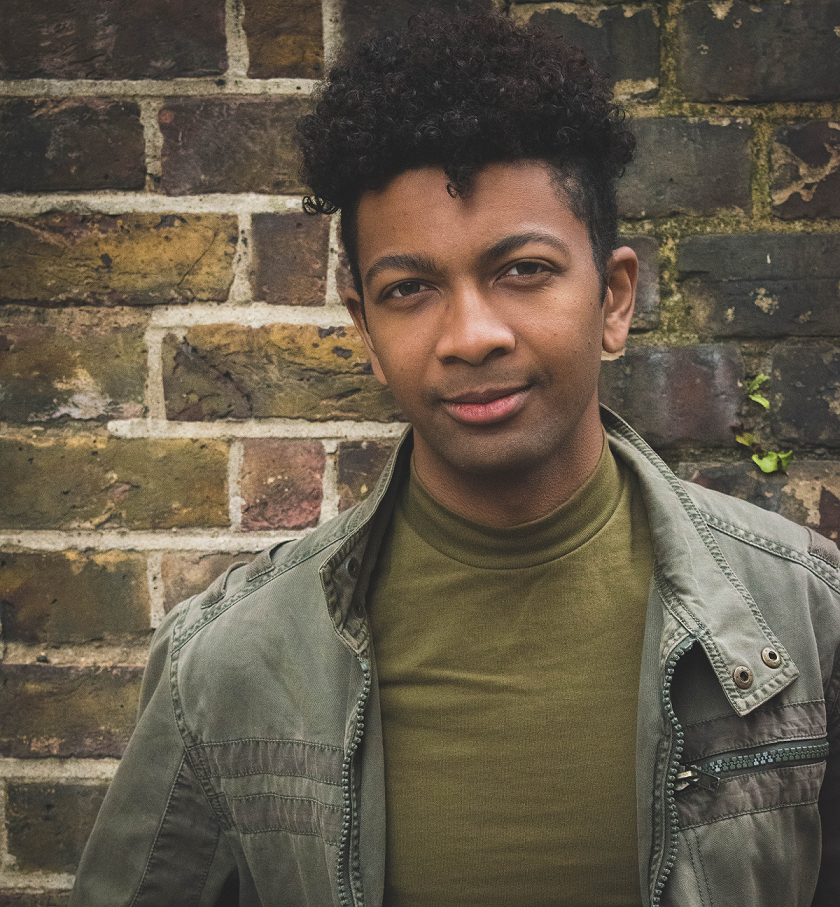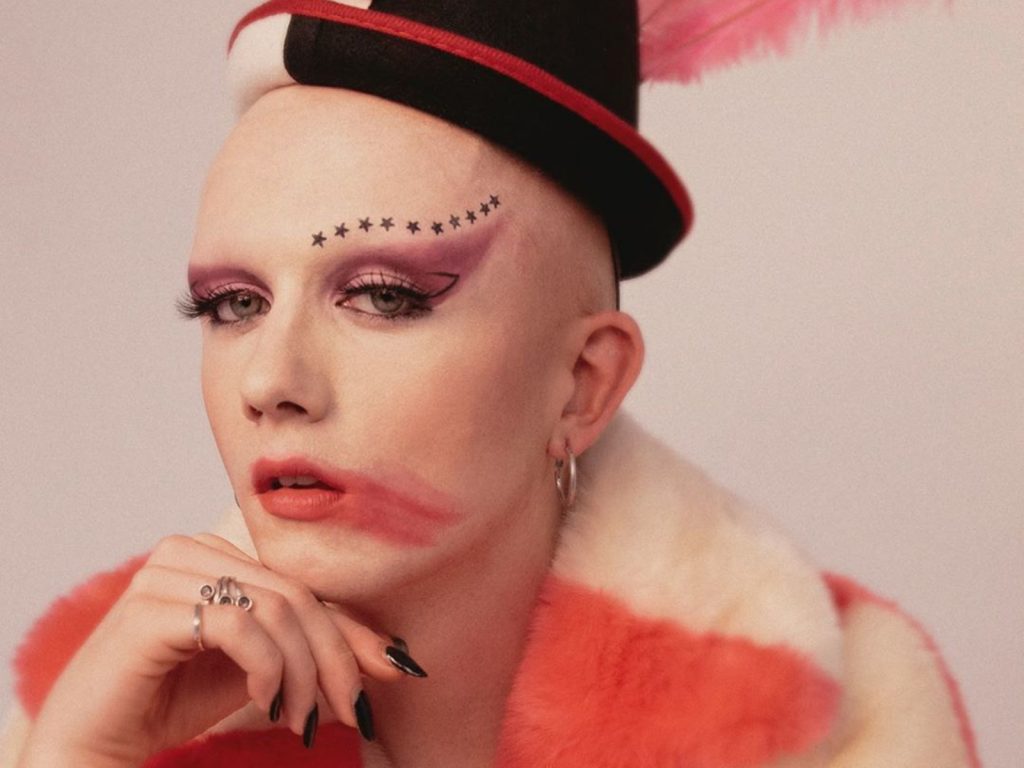
Tanaka Mhishi is a poet, playwright and performer who makes issue-based work. With a record of creating pieces which handle ‘tricky’ topics like sexual violence, masculinity, biphobia and race, Tanaka takes a bespoke, whole community approach; helping audiences have vital, difficult conversations one piece of art at a time. Ahead of his appearance at The Coast is Queer, Brighton & Hove’s festival of LGBTQ+ literature, he joins Fyne Times to discuss The Little Mermaid’s queerness, baking, and being an out survivor of sexual abuse.
What are you reading, watching, and listening to right now?
I’m digging deep into home and childhood in lockdown, revisiting books and music I used to love. Lots of Alan Gibbons and Jonathan Stroud in the book department, lots of embarrassing emo/nu-metal in the music. I’m also doing research for a book I’m writing about masculinity and touch, so a lot of nonfiction about bodies, trauma, self-harm, sport, and play.
In your poem, ‘Boy Poet’, you take us from flat champagne and cold sores, to cold champagne in a bar. Is this an optimistic piece about what life can become for creative souls?
I’m always a little bit wary of saying what I mean in a poem. I believe very much in that Neruda quote – that poems belong to those who need them, not those who write them when it comes to interpretation. For me, that poem is about cycles of leaning into vulnerability and then being too scared to stick with it, and about the weird glamour that creative people are ascribed, which can be a barrier to authenticity as much as a road towards it.
That poem speaks of wrists, which are also mentioned in ‘Bad Flowers and Graveyard Dirt’. Is that part of the body symbolically important in your poetry?
Yes! The thing about wrists is that they are fantastically vulnerable; you can bleed out and die by slitting your wrists. But they are also a key, useful part of the hand; they’re important, they’re powerful. And there’s a lot of queerness in them too; we joke about limp-wristedness but there’s so much we express through them. And when I was growing up my wrists were part of my body that was under scrutiny a lot because they were so skinny. I’ve been bullied about my wrists, I’ve found wrists attractive and melodramatic and everyday all at the same time.
In ‘Naked as a Lima Bean’ there’s chocolate, violets, and frangipani, as well as vodka, bleach, and snorting. Is marrying seemingly innocent things with those that might be regarded as more dangerous a common theme in your work as a poet and playwright?
I think it probably is, although I’m always scared that if I think too much about my themes I’ll never get away from them! What I can say is that I’m very interested in the idea of safety and danger, because we live in a world where we’re actually very bad at identifying what is and isn’t safe. Theatre relies on creating a feeling of danger in a physically safe space. Meanwhile we’ve all learned through COVID and things like Grenfell Tower that the places that feel safe (a home, a loved one’s arms) can actually be very dangerous. This is such a hard, hard thing for us to sit with as human beings. I think a lot of good comes from being curious about our relationship to danger and safety and not necessarily taking our feelings at face value.
Have the past nine months been a creative time for you?
Yes and no. I’ve often been very blocked, but also I’ve been doing a fair bit of community based work. Creatively I’ve spent a lot of time making notes for the future, trying to record how it feels to go through this. I suspect a lot of us will forget once the pandemic is over, how it felt to be in the thick of it, so I’m trying to preserve as much as I can of that. And that’s hard but it’s also a way of having faith in the future.
Do you feel the need to address COVID and lockdown in any of your work?
Not exactly? Or maybe not yet. I can see it surfacing but I’m very, very bad at timely writing. It’s almost never worked out for me. I have some bits of COVID writing, but they’re more messages to the future than things to release now while we’re in the thick of this.
How much baking have you done?
I literally have a separate section in my food budget for flour and butter. I think maybe I have a problem.
Your relationship with sex is, of course, complex – has lockdown intensified that complexity?
I don’t think it intensified it, but it has brought me in to confront a lot of issues which were on the back burner. I’m very interested in sex – theoretically as well as practically – so it’s one of the things I research and communicate about a lot when I have the time. And, without divulging too much, sex has just become a much more intense experience for me over the last year.
As a survivor of sexual abuse, have other survivors continued to reach out to you over the past year?
Yes, but that’s sort of normal for me now. Being an out survivor with a unique name means that being contacted by other survivors is just a feature of my life, especially as a male survivor. It’s one of the things I prepare for whenever I do public facing work. When someone reaches out it’s such an intensely vulnerable thing and to be honest, I feel this combination of being honoured and terrified by that trust – I’m learning to hold those moments better as I get more practice, I think. I’m gearing up to begin working with SurvivorsUK, a really fantastic organisation who primarily support male survivors across the country, and I’ve often referred people to them over the years. I think it’s such a privilege to be able to be part of someone’s recovery.
What can we expect from your appearance at The Coast is Queer festival?
Vulnerability, honesty and new ways of holding difficult subjects lightly. I’m also going to try to hold back on making bad puns, but no promises.
Who else are you looking forward to seeing at the festival?
Campbell X and Jamie Windust; I’ve seen both of them talk before and they’re amazing!

What else is on your agenda?
I’m releasing a podcast called Loving Colour, where a white friend and I tackle topics around race through storytelling, and I’m just finishing the first draft of a memoir about masculinity and touch. Also, I’m afraid the baking is going to escalate; I nearly ordered a croquembouche cone online the other night.
This is our LGBT+ History Month edition. Do you think queer history is becoming easier and easier to access?
Yes and no. I think there are strands of queer history that are more and more accessible, which is fantastic. I’d love to see queerness honoured in other historical narratives as well. I wrote a poem last year about the bisexuality of Hans Christian Andersen and how that might have fed into his writing and arguably the entire popular western storytelling tradition. There’s a reason The Little Mermaid feels so important to LGBT+ people, and it’s not just about Disney! And the improvement is happening too unevenly too; with white, urban gay men’s history in a comparatively good place and everyone else’s sort of dawdling behind. But we’re getting there, slowly and surely. For me it’s a case of illustrating that queer history touches everyone’s lives, not just those of us within the community.
The Coast is Queer, Brighton & Hove’s festival of LGBTQ+ literature, returns in a special online version from 5-7 February 2021.

